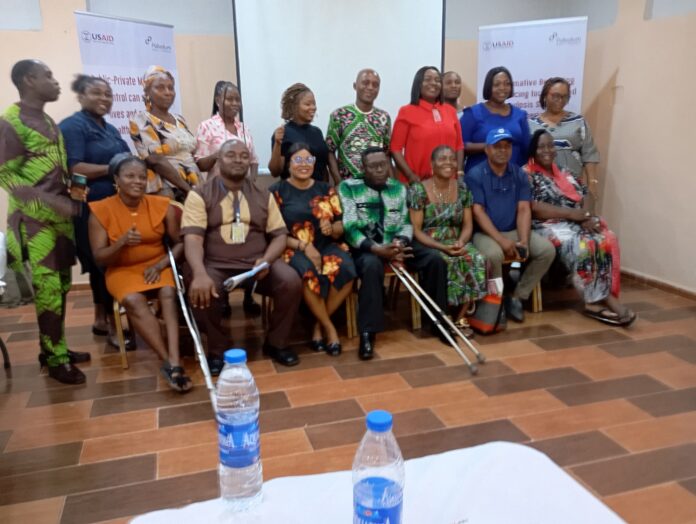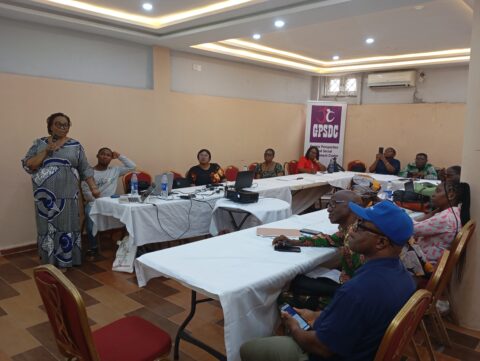….as GPSDC Seeks More Private Sector, Community Stakeholders Involvement in Creating Awareness and Control of TB
By Uzo Ugwunze
Gender Perspective and Social Development Centre (GPSDC) has called on the Private Sector and Community Stakeholders to join the fight against the highly communicable Tuberculosis(TB) infection and disease saying that many people are living with TB without knowing thereby exposing other members of the society to the disease.
Executive Director,GPSDC,Anekwe Eucharia Ijeoma made the call recently during a one day capacity building workshop for Civil Society Organizations (CSOs) and the Media on Tuberculosis Intervention at Awka saying that the National, State budget and Donor agencies’ funding was not sufficient for the detection and treatment of TB.
Anekwe who tasked media practitioners to help in the sensitization about the prevalence of TB in the state and the need for the State Government to declare a state of emergency on TB intervention also urged well spirited individuals in communities and captains of industry within the private sector to consider sponsoring TB control and treatment efforts because anyone could be a victim.
According to World Health Organization WHO, TB is an infectious disease that most often affects the lungs and is caused by a type of bacteria. It spreads through the air when infected people cough, sneeze or spit. Tuberculosis is preventable and curable. About a quarter of the global population is estimated to have been infected with TB bacteria.
Speaking during the workshop, the Program Manager, Anambra State TB, Leprosy & Brully ulcer control program, Dr Ugochukwu Chukwulobelu who was represented by the Monitoring & Evaluation Officer, Mrs Chiamaka Oguejiofor revealed that about 5700 cases of TB was diagnosed within the first two quarters of 2014 in Anambra State adding that it is one of the significant public health challenges the state is faces.
“There is an estimated prevalence rate of 323 per 100,000 people. TB incident rate is approximately 219 per 100,000 people annually. 3200 cases of TB was diagnosed In the first quarter of January to March 2024 while 2500 TB cases was diagnosed between April and June 2024”.
“Tuberculosis spreads easily where people gather in crowds or where people live in crowded places or rooms without ventilation. There are persons infected who have no symptoms of TB(Latent TB infection) and anybody can easily be infected without knowing. Nobody knows who will be the next to be infected in schools, churches, bus, keke or market place.
“The risk factors for infection include exposure to an untreated case, Susceptibility to infection, Weakening immunity due to HIV/AIDS infection, Diabetes mellitus, Prolonged intake of steroids and use of anti cancer drugs, Chronic alcoholism, Malnutrition in the case of children”.
“Symptoms of TB include Fever, Cough (about 2 weeks or more), Shortness/Difficult breathing, Tiredness, Coughing out blood, Chest pain, Night sweats, loss of appetite, Weight loss. TB can be Drug Susceptible (DSTB) or Drug Resistant (DRTB). Both are curable within 6 months of full dosage and regular intake of TB drugs but the suspected case needs to undergo proper TB test to determine wether it is DSTB or DRTB”, Oguejiofor said.
Mrs Oguejiofor said that although in 2023, Anambra State met 95% of the TB cases finding target, 90% treatment success rate, 59% for childhood TB case finding target and 32% for Drug Resistance Tuberculosis (DRTB) case finding target, there were lots of challenges facing TB control, monitoring and treatment which requires funding saying that funds sourced majorly from National budget and Donor agencies’do not suffice.
“Community Based Organizations(CBOs) face delayed payments to community TB workers which led to withdrawal of Community TB workers; Strain on CBOs resources to maintain operations without adequate workforce, administration bottlenecks in processing payments; and Challenges in reengaging community members after workers withdrawal,” she stated.
“Program Scope of Implementation in Anambra include about 800 Direct Observed Treatment Short-course(DOTs) across various communities, Public Private Mix for TB control efforts, Community Engagement, Laboratory Strengthening, Intergrated TB/HIV services, Addressing MDR-TB, Surveillance and Monitoring.
Moreover, the State Coordinator TB Network, Anambra State, Ifeyinwa Unachukwu lamented that sometimes money budgeted for TB intervention is not the actual money disbursed saying that even when it is disbursed it is not sufficient to meet the various demands of TB detection, control, prevention and treatment.
“The CSOs are concerned about the prevalence of TB and seek increased TB funding from Private Sectors and community Stakeholders. TB can infect anyone even people at the Government house.
“In Anambra TB funding is dependent on National and Donor agencies, State Government put in less fund for TB intervention after budget because of lack of earmarked funds.
“TB is dependent on advocacies. There is Donor fatigue because the Donor agencies like USAID believes that Nigeria has come off age. The Donor agencies restricted their intervention to five LGAs in Anambra because of paucity of funds.
“TB intervention is just like erosion menace which only the state government cannot tackle alone, the National, State, Donor agencies, private sector and Community Stakeholders can be of immense help on TB control efforts”.
“In Anambra State some successes have been recorded. They include Scale up of GeneXpert machines from 9 to 13 in the State but with more funding more can be procured for at least one for each of the 21 LGAs. There is need for more funding for PHC and community workers and retraining on proper TB sample collection and monitoring,” said Unachukwu.








